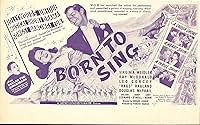It's been suggested that the ending of "Born to Sing" was some sort of jingoistic war- promoting effort spliced on the end of this film--and it certainly was badly spliced, especially since we are not shown its effect on the audience, which up until the end has been a living part of the film. It should be said, though, that the piece "Ballad for Americans" which concludes the film actually was written for a WPA Theatre production, "Sing for Your Supper," in 1939. This show, 18 months in rehearsal, brought about the end of WPA's "Federal Theatre Project" and never reached much of an audience.
"Ballad for Americans," though, was written by John Latouche and Earl Robinson, who later produced one of the best American operas, "The Ballad of Baby Doe." The "Ballad for Americans" was introduced on radio by Paul Robeson, who recorded it as did Bing Crosby, and both recordings were best-sellers. The piece was actually performed at the 1940 Republican AND American Communist Party Conventions, and remained in the repertoire through the 1960's. The piece seems rather dated and jingoistic today, though oddly enough it was considered pretty left-wing at the time! I've always had a soft spot for it, as did my high school choir director. The shouted/spoken parts of the piece were a popular device of the time, another practice that lingered through the 1960's in various guises. I think that its inclusion in the film was meant to show just what a fine composer the Virginia Weidler character's father (Henry O'Neill) was (although it stretches the imagine a bit to think that in a couple of evenings Virginia could play it out a few notes at a time on the harmonica and have it transposed by an eight-year-old kid ("Mozart"--Richard Hall) who has to draw his own staff paper.) Unfortunately, we don't know whether it did that or not, because the film ends abruptly at the end of the piece--almost as if the production had run out of money so everybody went home.
Actually, I think it was pretty spiffily staged by Busby Berkeley, in a way that is reminiscent of his "Forgotten Man" number at Warner's and in a way that recalls the Deco/Moderne style of much of WPA art.
It should also be noted that Joe Yule is featured in a (very) minor role here at a time when his son, Mickey Rooney (AKA Joe, Jr.), was MGM's biggest meal ticket.



















